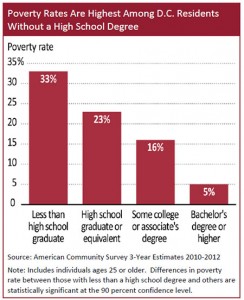The budget recently passed by the DC Council includes two provisions that will benefit District adults who need basic skills education in order to achieve greater economic security. These investments are important because District adults without a high school diploma or equivalent are more than twice as likely to be poor as those with some college or an associate’s degree (see Figure), and our current system is not well-designed to help adult learners move from adult basic skills to get a GED and then on to post-secondary success.
One provision in the budget establishes an Adult Career Pathways Task Force housed by the Workforce Investment Council. With funding for a senior staff person and technical assistance (a total of $175,000), this task force has been charged with analyzing the current use of the District’s adult literacy dollars across agencies and funding streams, and developing a plan to better integrate adult literacy services with workforce and career training. These integrated services will enable adult learners to advance in workforce skills and knowledge at the same time as they advance in basic literacy, numeracy, and computer literacy. They will include industry-specific credentials and certifications so learners are building their earning capacity while increasing their literacy skills.
The District currently offers a variety of literacy programs, some better integrated with industry than others. When the programs are aligned properly into “career pathways,” they enable learners to move seamlessly from one level to the next by making sure that the exit criteria from one stage match the entrance criteria for the next. Career pathways are key to helping low-income adults at all stages of the education spectrum move toward greater economic security, whether they are starting at a third grade reading level or have already passed their GED. The Task Force is expected to have its recommendations by June 1, 2015.
The second provision added funds to the Office of the State Superintendent of Education’s Post-Secondary and Career Education Division to provide clinical learning disability assessments for 200 adult learners. Why is this important? We know that students with disabilities are more likely to drop out of school, and thus are disproportionately represented in the adult learner population. People with documented learning disabilities are eligible for accommodations when they take high school equivalency and industry certification exams. For example, just as a blind student might be provided a computer that will read questions aloud, a student with a learning disability that affects memory might need additional time to complete a math test that relies on memorization of math facts. Without appropriate assessments and documentation, adults with learning disabilities may fail exams that they would otherwise be able to pass. However, it is not sufficient just to know that someone has a disability. The specific areas of disability must be named and must justify the specific accommodations requested. Good information about specific learning deficits has benefits in addition to test accommodations: instructors can use it to tailor instruction to help adults with disabilities master necessary skills.
We will be monitoring the implementation of these investments to ensure they produce better results for adult learners in the District.
To print a copy of today’s blog, click here.

